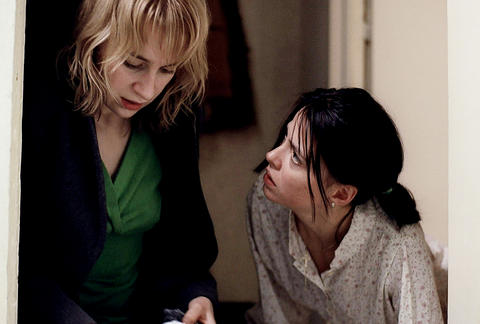In Cristian Mungiu's 4 Months, 3 Weeks and 2 Days the Romanian actress Anamaria Marinca plays Otilia, a college student in her early 20s in Bucharest, who, by the story's end, has the disillusioned gaze of someone who isn't young at all.
The movie, which won the Palme d'Or at Cannes this year, is set on a single day in 1987 in Romania, two years before the violent end of the Ceausescu regime, which had outlawed both abortion and contraception. Otilia's best friend, Gabita, is pregnant and barely capable of facing the brute reality of her circumstances. It falls to Otilia to wheedle, bribe and contend with the grotesque demands of the leather-jacketed abortionist who creepily calls himself Mr Bebe, and to provide what comfort she can to her hapless friend.
At a New York Film Festival luncheon last month, Marinca, 29, right, appeared spritelike, slim, pretty and ebullient, quoting a favorite writer ("As Ondaatje says, 'Biography is everything.''') and bubbling with curiosity and ideas.

On the screen her transformation is remarkable. Tense and, initially at least, briskly competent, her Otilia looks tall, strong and rather plain, while Marinca's quick intelligence is evident in the character's alert, expressive face. At first Otilia seems like a typical college girl: eagerly examining some American cosmetics for secret sale in her dorm, giving her boyfriend a good-luck snuggle before he takes an important exam. But as she navigates the darker irregularities of a dangerous black market transaction in a severely deranged society, her youthful resilience loses its elasticity, gradually giving way to something bruised and worse.
At the festival luncheon Marinca pointed out that Otilia emerges from the ordeal knowing her own strength as never before. She does, but in a last close-up, her still face and anguished eyes suggest the terrible cost.
The film won the top prize at the European Film Awards in Berlin.

June 2 to June 8 Taiwan’s woodcutters believe that if they see even one speck of red in their cooked rice, no matter how small, an accident is going to happen. Peng Chin-tian (彭錦田) swears that this has proven to be true at every stop during his decades-long career in the logging industry. Along with mining, timber harvesting was once considered the most dangerous profession in Taiwan. Not only were mishaps common during all stages of processing, it was difficult to transport the injured to get medical treatment. Many died during the arduous journey. Peng recounts some of his accidents in

“Why does Taiwan identity decline?”a group of researchers lead by University of Nevada political scientist Austin Wang (王宏恩) asked in a recent paper. After all, it is not difficult to explain the rise in Taiwanese identity after the early 1990s. But no model predicted its decline during the 2016-2018 period, they say. After testing various alternative explanations, Wang et al argue that the fall-off in Taiwanese identity during that period is related to voter hedging based on the performance of the Democratic Progressive Party (DPP). Since the DPP is perceived as the guardian of Taiwan identity, when it performs well,

A short walk beneath the dense Amazon canopy, the forest abruptly opens up. Fallen logs are rotting, the trees grow sparser and the temperature rises in places sunlight hits the ground. This is what 24 years of severe drought looks like in the world’s largest rainforest. But this patch of degraded forest, about the size of a soccer field, is a scientific experiment. Launched in 2000 by Brazilian and British scientists, Esecaflor — short for “Forest Drought Study Project” in Portuguese — set out to simulate a future in which the changing climate could deplete the Amazon of rainfall. It is

Artifacts found at archeological sites in France and Spain along the Bay of Biscay shoreline show that humans have been crafting tools from whale bones since more than 20,000 years ago, illustrating anew the resourcefulness of prehistoric people. The tools, primarily hunting implements such as projectile points, were fashioned from the bones of at least five species of large whales, the researchers said. Bones from sperm whales were the most abundant, followed by fin whales, gray whales, right or bowhead whales — two species indistinguishable with the analytical method used in the study — and blue whales. With seafaring capabilities by humans